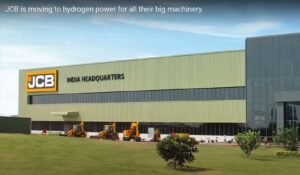Hydrogen Power In a landmark move that signifies a paradigm shift in sustainable construction practices, JCB, the British multinational heavy equipment manufacturer, has unveiled its groundbreaking hydrogen-powered backhoe loader in India.
Hydrogen power
JCB 3DX backhoe loader represents a significant leap forward in the quest for sustainable energy solutions. Unlike conventional fossil fuels, hydrogen offers a clean alternative that produces water vapor as its only by-product when used in fuel cells or internal combustion engines. These characteristic positions hydrogen as a potential key player in achieving global carbon neutrality goals.
JCB’s Hydrogen-Powered Backhoe Loader
JCB, a renowned manufacturer of construction equipment, has taken a bold step by unveiling a prototype backhoe loader powered by a hydrogen motor. This initiative is part of JCB’s broader commitment to environmental sustainability and innovation in machinery design.
The Hydrogen Motor
The hydrogen motor developed by JCB operates on the principle of internal combustion, similar to traditional diesel engines. However, it combusts hydrogen gas instead of diesel fuel. The motor’s design allows it to harness the energy from hydrogen efficiently, providing the necessary power for heavy-duty construction tasks without emitting carbon dioxide.
Zero CO2 Emissions
The most significant advantage of JCB’s hydrogen-powered backhoe loader is its zero CO2 emissions at the point of use. This feature aligns with global efforts to reduce greenhouse gas emissions and combat climate change. By eliminating CO2 emissions, JCB’s machinery contributes to cleaner air quality and a reduction in the construction industry’s carbon footprint.
The Development Process
JCB’s journey towards hydrogen power began with a vision to create a zero-carbon future. The company’s engineers have adapted existing engine technologies and utilized readily available components to develop the hydrogen motor. This approach has allowed JCB to create a viable prototype without starting from scratch, accelerating the development process.

Mobile Hydrogen Refueling Unit
To support the practical use of hydrogen-powered machinery, JCB has also developed a mobile hydrogen refueling unit. This unit addresses the challenge of refueling construction equipment on-site, where traditional fueling infrastructure may not be available. The mobile unit ensures that JCB’s backhoe loaders can operate efficiently and continuously, regardless of location.
Pilot Deployment and Future Plans
While JCB’s hydrogen-powered vehicles are not yet commercially available, they are undergoing pilot testing on various off-road machines. These tests are crucial for assessing the performance and reliability of the hydrogen motor under real-world conditions.
JCB plans to introduce its hydrogen-powered machinery to the Indian market, recognizing the country’s need for alternative fuels and the potential to reduce reliance on imported fossil fuels. The introduction of hydrogen power in India could have a transformative impact on the construction industry and the nation’s energy landscape.
A Pivotal Moment for India’s Construction Industry
The unveiling of JCB’s hydrogen-powered backhoe loader in India represents a pivotal moment for the country’s construction industry. This groundbreaking innovation aligns with India’s National Hydrogen Mission, which aims to establish a robust hydrogen ecosystem and promote the use of hydrogen-powered vehicles.
By adopting hydrogen-powered equipment, the construction industry can significantly reduce its carbon footprint and contribute to achieving India’s ambitious climate targets. Moreover, hydrogen-powered construction equipment offers a competitive edge, as it operates in a cleaner, more environmentally friendly manner, appealing to clients and stakeholders who prioritize sustainability.
The Vision Behind the Innovation
Lord Anthony Bamford, the Chairman of JCB, has been the driving force behind the company’s push towards hydrogen power. His vision of hydrogen as a sustainable fuel source is rooted in the goal of achieving zero carbon emissions by 2050. Since 2019, JCB’s innovation team has invested significant resources in developing the hydrogen combustion engine, reflecting Lord Bamford’s commitment to a greener future.
Environmental and Industry Implications
The adoption of hydrogen-powered construction machinery has far-reaching implications for both the environment and the construction industry. Environmentally, it represents a major step towards reducing the sector’s carbon emissions and mitigating the effects of climate change. For the construction industry, it signals a shift towards more sustainable practices and the potential for cost savings in the long term as the world moves away from fossil fuels.
Conclusion
JCB’s hydrogen-powered backhoe loader is a groundbreaking development that showcases the company’s dedication to innovation and environmental responsibility. As the construction industry continues to evolve, the integration of hydrogen power into heavy machinery will play a crucial role in building a sustainable future. With continued research and development, JCB’s pioneering efforts could pave the way for widespread adoption of clean energy solutions in construction and beyond.
This detailed exploration of JCB’s hydrogen-powered backhoe loader highlights the significance of sustainable energy in the construction industry and the potential benefits of hydrogen power for the environment and the economy. JCB’s initiative serves as an inspiring example of how technological advancements can contribute to a cleaner, greener world.
Read also :- https://globalheadlinetoday.com/ineos-grenadier-quartermaster-production/





